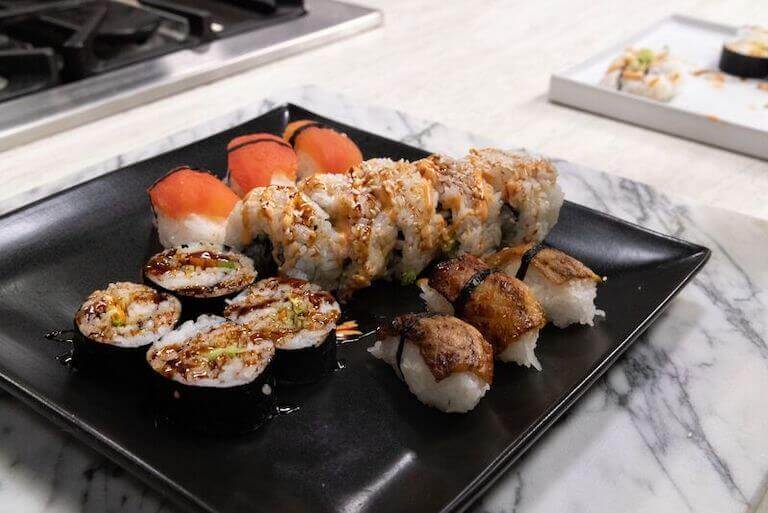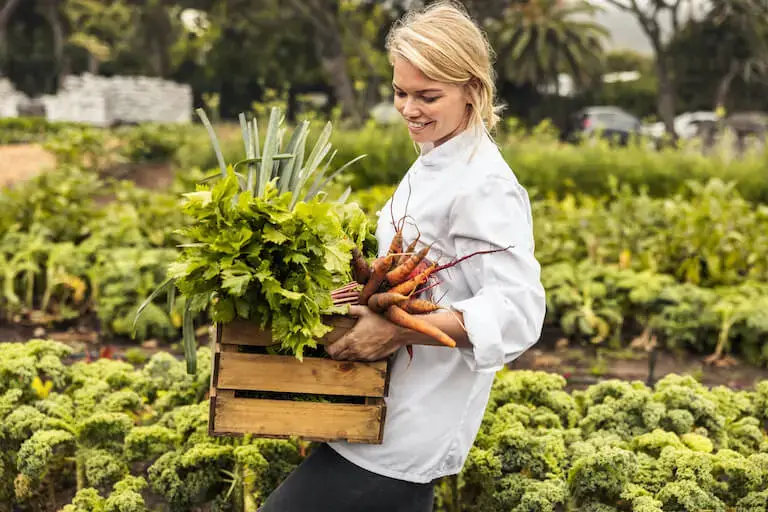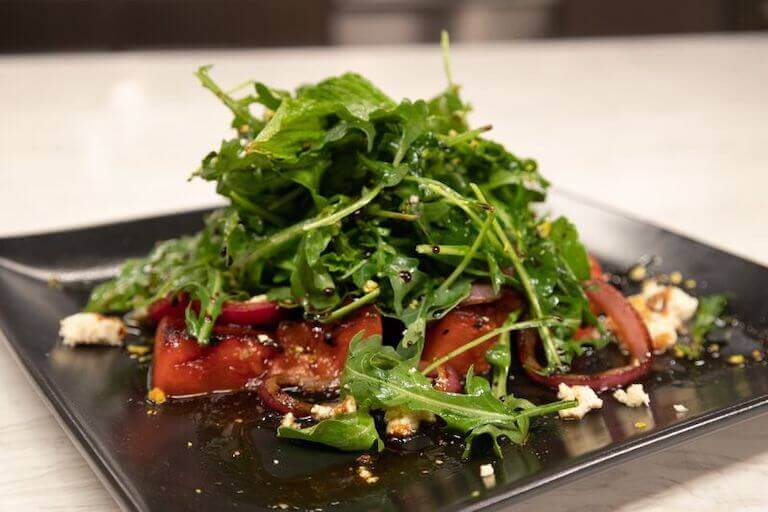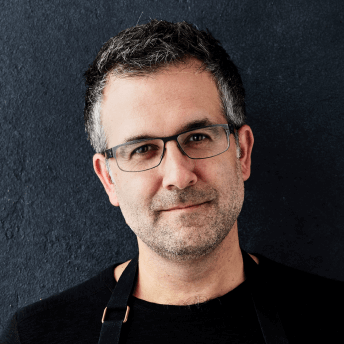Listen to This Article:
What happens when you take classical French culinary training and remove the meat, dairy, and eggs?
In the kitchens at Auguste Escoffier School of Culinary Arts, plant-based students still practice their brunoise cuts and balance acid to develop flavor. But instead of using butter, they might reach for coconut oil. Instead of veal stock, they might build depth with shiitake and kombu broth.
Choices like these show how culinary education is adapting to industry demand. Between 2019 and 2022, the share of U.S. adults who followed a plant-rich diet more than doubled, rising from 12.1% to 25.8%. The plant-based food market in North America was valued at approximately $10.24 billion in 2022 and continues growing strong.
This shift has created new demand in kitchens across the country—not just for plant-forward menus, but for culinary professionals who know how to work with a broader range of ingredients, textures, and flavors.
What follows is a closer look at how Escoffier’s Plant-Based Culinary programs, through the Boulder campus and online program, take the structure of a traditional culinary education and teach it through a different lens—one rooted in creativity, sustainability, and changing industry demands.
A Side-by-Side Comparison: Structure and Core Curriculum
At first glance, the structure of Escoffier’s Plant-Based program mirrors that of a traditional culinary education. Students build essential techniques:
- Knife work and consistency in cuts
- Mise en place and kitchen organization
- Sanitation and food safety protocols
- Time and temperature control
- Flavor development
- Plating and presentation
- Baking and pastry fundamentals

Students explore a variety of ways to get creative with plant-based recipes, even with sushi!
“From day one, learning how to hold my knife correctly was a major game changer,” said Jeanette Rideau, a plant-based online graduate.
But while the methods are consistent, the materials shift.
In the plant-based program:
- Stocks can be mushroom- or seaweed-based instead of bone broth
- Creaminess may come from nut or seed emulsions rather than heavy cream
- Egg-free baking can use flaxseed or aquafaba
- Flavor builds through umami-rich ingredients like miso and nutritional yeast instead of relying on meat and dairy for depth
This approach maintains the rigor of classical training while equipping students with a versatile toolkit of plant-based ingredients and techniques.
*Information may not reflect every student’s experience. Results and outcomes may be based on several factors, such as geographical region or previous experience.
Diploma vs. Degree: Two Learning Paths
Students can choose between a Diploma and an Associate of Occupational Studies (A.O.S.) degree in Escoffier’s Plant-Based program. Both options include a hands-on industry externship and follow a structured curriculum, but the A.O.S. adds a second externship and goes more in-depth into areas like leadership and operations.
Courses in the plant-based track include:
- Plant-Based Culinary Foundations
- Plant-Based Pastry Foundations
- Cultural Influences
- Plant-Based Approaches to Wellness
- Foodservice Management, Cost Control, and Psychology in the Workplace (A.O.S. only)
Maria Rodriguez, who came to the program as a health coach pursuing her private chef goals, appreciated the practical focus.
“You’re not only learning your recipes—you’re learning the skills you are going to use in life,” Rodriguez said.
Culinary Program Comparison
| Aspect | Traditional Culinary Track | Plant-Based Culinary Track |
|---|---|---|
| Core Culinary Foundations | Techniques grounded in classical French cuisine | Same foundational techniques adapted to plant-based ingredients |
| Pastry Curriculum | Traditional pastry techniques using dairy and eggs | Non-dairy and egg-free pastry training |
| Cultural Cuisine Focus | ✅ Global cuisine with traditional focus | ✅ Emphasis on plant-forward global cuisines (e.g., Mediterranean, Ayurvedic) |
| Nutrition & Wellness | ⚠️ Touched on, not central | ✅ Expanded focus on plant-based nutrition and wellness principles |
| Business & Hospitality Courses (A.O.S.) | ✅ Management, cost control, psychology, entrepreneurship | ✅ Covers comparable business, management, and hospitality topics |
| Externships | ✅1–2 externships required | ✅ 1–2 externships required |
| Program Formats | ✅ On-campus & online options | ✅ Fully online or Boulder campus |
| Primary Ingredients Used | Meat, dairy, eggs, fish, classical sauces | Fruits, vegetables, legumes, grains, nuts, plant oils |
Practice, Feedback, and Real-World Experience
While studying at Escoffier, students may receive feedback from experienced chef instructors, collaborate with peers, and complete assignments modeled after industry practices. Every student also completes an externship to apply their training in a working kitchen—often in restaurants, wellness spaces, or food businesses aligned with plant-forward values.
More Than Technique: The Broader Scope of Learning
Learning to cook is just one part of becoming a culinary professional. Escoffier’s plant-based program builds technical skills, but it also asks bigger questions, similar to those posed in other culinary programs: Where does food come from? How does it affect our bodies and the environment? What role can a chef play beyond the kitchen line?
Students can explore wellness, sustainability, and global food systems in tandem with hands-on techniques. In Plant-Based Approaches to Wellness, for example, students study how ingredients support physical health and how plant-based meals can serve specific dietary needs. Cultural Influences on Plant-Based Cuisine examines the global roots of vegetarian and vegan cooking—from Ayurvedic traditions to plant-forward Mediterranean staples.

Gathering fresh produce from a garden and bringing sustainability and ingredient awareness directly into the kitchen.
*Information may not reflect every student’s experience. Results and outcomes may be based on several factors, such as geographical region or previous experience.
Students pursuing the Associate degree can go even deeper, with classes in:
- Foodservice management
- Managerial accounting
- Psychology in the workplace
- Entrepreneurship and communication
These subjects are designed for students who may want to manage a team, launch a business, or work in wellness-driven or mission-aligned food environments.
“I knew how to cook,” said online plant-based graduate Pam Lin, “but the business management classes, learning proper techniques, and receiving chef feedback has given me more confidence to move forward.”
Who Takes Plant-Based Culinary Classes at Escoffier?
Plant-based culinary students at Escoffier bring a wide range of motivations to the kitchen. Some are pursuing a new career, while others want to enhance an existing one. Many are drawn by health, sustainability, or curiosity—not necessarily by strict dietary rules.
Students come from diverse backgrounds. Some are personal chefs looking to expand their menus. Others are health coaches, food entrepreneurs, or home cooks seeking to turn their passion into a profession. Experience levels vary. So do ages and goals.
Chef Shane Witters Hicks, a Boulder plant-based graduate, has seen this shift firsthand: “People are starting to play with the idea that there might be a better way of doing things than just the traditional meat and dairy way of cooking… and society is accepting it.”
*Information may not reflect every student’s experience. Results and outcomes may be based on several factors, such as geographical region or previous experience.
Creativity, Not Compromise: Culinary Expression in a Plant-Based Kitchen
In traditional culinary education, creativity is often built on a familiar palette—stocks, dairy-based sauces, meat-centric entrées. When those standard tools of meat, dairy, and butter are removed, students draw on the same creative instincts and technical curiosity found in all culinary training, but apply them in new ways to build flavor and texture from plant-based ingredients.
These are just a few of the ways Escoffier students may explore new culinary possibilities:
- Build umami from roasted mushrooms
- Create richness with nut and seed emulsions
- Develop egg-free pastry structures with aquafaba or flaxseed
- Combine fermented and raw elements for flavor layering

Grilled watermelon topped with arugula and pickled onion showcases how Escoffier students use unconventional plant-based ingredients to create contrast, complexity, and visual appeal on the plate.
“By adopting a more plant-centric diet, you’re going to be forced to be more creative, or you’re going to be forced to investigate ingredients that you never thought you’d cook with,” said Chef Shane Witters Hicks. “As a result, I think it’s actually kind of an expansion of your culinary capacities.”
Lauren Lewis, a private chef and plant-based enthusiast, describes it this way: “The biggest misconception is that (plant-based is) limiting or bland… when in fact, it opens us up to an entirely new set of ingredients. You start to look a little more closely at what’s growing in the world. The bounty is really endless.”
In an industry that increasingly values adaptability and inclusivity, this kind of creativity can be a competitive edge.
*Information may not reflect every student’s experience. Results and outcomes may be based on several factors, such as geographical region or previous experience.
Career Outcomes: What Can You Do With a Plant-Based Culinary Education?
Career options for graduates of Escoffier’s plant-based culinary program can extend well beyond vegan cafés or health retreats. While those paths remain available, the skills students gain are versatile enough to support a wide range of culinary careers, many of which intersect with traditional tracks.
Program graduates may go on to become:
- Restaurant chefs (in plant-based or omnivorous kitchens)
- Personal or private chefs
- Caterers or food truck owners
- Plant-based product developers (R&D)
- Culinary instructors or content creators
- Health and wellness professionals with a culinary edge

Escoffier graduates may apply their plant-based training to launch food trucks, pop-ups, or private chef businesses—bringing fresh, creative cuisine directly to their communities.
The demand for plant-based food is rising across sectors—from fine dining and fast casual to meal kits and CPG brands. The North American plant-based food market is projected to grow from $5.72B in 2024 to $12.87B by 2031—a 12.3% CAGR. Culinary professionals with fluency in plant-based techniques are increasingly valuable to restaurants looking to diversify their menus or meet sustainability goals.
The Right Program Depends on Your Goals
Escoffier’s plant-based program is a full culinary education built on the same professional standards as a traditional track. Whether online or on campus, the path is structured, rigorous, and intended to help build confidence through hands-on experience. The outcomes are as diverse as the students themselves—and the possibilities continue to expand for many graduates.
To find out how professional training and real-world experience could help prepare you to meet this growing demand, contact us to explore Escoffier’s Plant-Based Culinary Arts programs.
WANT TO FURTHER EXPLORE PLANT-BASED COOKING? READ THESE ARTICLES NEXT!
- Plant-Based vs. Vegan: Why Chefs Need to Know the Difference
- How Photographer Bree Chumley Built a Plant-Based Food Career from her Home Kitchen
- From Goat’s Milk to Tofu: How Escoffier Grad Lolita Sereleas Blends Tradition with Innovation in Plant-Based Cuisine
*Information may not reflect every student’s experience. Results and outcomes may be based on several factors, such as geographical region or previous experience.



